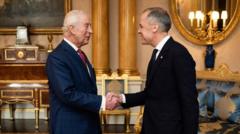As King Charles III prepares for a state visit to Canada, Prime Minister Mark Carney's invitation has ignited discussions about the nation’s identity and its complex ties to the British monarchy. This visit, the first by a British monarch in nearly 70 years, is not only a cultural event but a careful political statement aimed at showcasing Canadian sovereignty, particularly in the context of ongoing tensions with the United States under President Trump.
King Charles III's Upcoming Visit to Canada: A Symbol of Sovereignty

King Charles III's Upcoming Visit to Canada: A Symbol of Sovereignty
A historic invitation from PM Mark Carney reflects Canada’s evolving relationship with the monarchy amidst pressures from the US.
In recent years, Canada’s relationship with the monarchy has witnessed a fundamental transformation. A decade ago, the actions of then-Prime Minister Stephen Harper, which included opting for a portrait of the Queen over local artwork, sparked a backlash and raised questions about Canada's ties to its colonial past. However, Carney’s invitation marks a pivot back towards royal engagement, emphasizing Canada’s distinctiveness and independence in the face of external pressures.
Historian Justin Vovk has noted that this diplomatic move seeks to counteract Trump's dismissive remarks that often suggest Canada would be better off as America's “51st state.” The invitation, framed as a display of Canada’s unique traditions and values, asserts the legitimacy and sovereignty of the nation at a crucial moment where political dynamics shift rapidly.
Historically, while the British monarchy has been a part of Canada’s identity, it has not been without contention. The provinces, particularly Quebec, have expressed ambivalence towards the monarchy, calling for a reassessment of these ties. Carney's administration plans to navigate these sentiments while reinforcing the traditional link by welcoming Charles III.
The upcoming visit also represents an opportunity to build diplomatic relations with both Trump and broader European allies, reflecting Carney’s vision for Canada to establish new partnerships amidst changing global landscapes. Though many Canadians may feel indifferent towards the monarchy, the pageantry of the King's visit serves a deeper political function—it aims to portray a united Canada, ready to assert its independence and reaffirm its historical bonds, while sending a decisive message to the world and to Trump himself.
The King's journey to Canada, despite being short, aims to forge a renewed connection to a shared history and present a united front against external challenges. As the monarchy engages with the Canadian public, discussions surrounding reconciliation with Indigenous communities and questions about the Crown's historical role in Canada will continue to rise, ensuring that this visit is not simply ceremonial but rather a pivotal moment of reflection for the nation.
This historical event, taking place under a changed political climate, promises to resonate well beyond the confines of the modern parliamentary process, making it a significant chapter in Canada's ongoing story of self-determination and identity.
Historian Justin Vovk has noted that this diplomatic move seeks to counteract Trump's dismissive remarks that often suggest Canada would be better off as America's “51st state.” The invitation, framed as a display of Canada’s unique traditions and values, asserts the legitimacy and sovereignty of the nation at a crucial moment where political dynamics shift rapidly.
Historically, while the British monarchy has been a part of Canada’s identity, it has not been without contention. The provinces, particularly Quebec, have expressed ambivalence towards the monarchy, calling for a reassessment of these ties. Carney's administration plans to navigate these sentiments while reinforcing the traditional link by welcoming Charles III.
The upcoming visit also represents an opportunity to build diplomatic relations with both Trump and broader European allies, reflecting Carney’s vision for Canada to establish new partnerships amidst changing global landscapes. Though many Canadians may feel indifferent towards the monarchy, the pageantry of the King's visit serves a deeper political function—it aims to portray a united Canada, ready to assert its independence and reaffirm its historical bonds, while sending a decisive message to the world and to Trump himself.
The King's journey to Canada, despite being short, aims to forge a renewed connection to a shared history and present a united front against external challenges. As the monarchy engages with the Canadian public, discussions surrounding reconciliation with Indigenous communities and questions about the Crown's historical role in Canada will continue to rise, ensuring that this visit is not simply ceremonial but rather a pivotal moment of reflection for the nation.
This historical event, taking place under a changed political climate, promises to resonate well beyond the confines of the modern parliamentary process, making it a significant chapter in Canada's ongoing story of self-determination and identity.




















